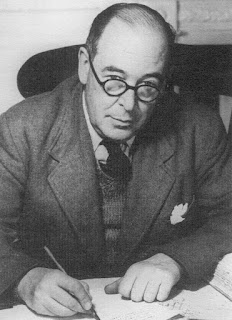Final Interview
Clive Staples Lewis, one of the greatest Christian writers of the 20th century, gave a final interview to Sherwood Eliot Wirt for the Christian Broadcasting Network before his death in 1963.Wirt found his quarry at Cambridge in spartan surroundings, seated 'at a plain table bearing an old fashioned alarm clock and inkwell':
Wirt: Professor Lewis, if you had a young friend with some interest in writing on christian subjects, how would you advise him to prepare himself?
Lewis: I would say if a man was going to write on chemistry, he learns chemistry. The same is true of christianity. But to speak of the craft itself, I would not know how to advise. It is a matter of talent and interest. I believe he must be strongly moved if he is to become a writer. Writing is like a 'lust', or like scratching when you itch. Writing comes as a result of a very strong impulse, and when it does come, I for one must get it out.
Wirt: Can you suggest an approach that would spark the creation of a body of christian literature strong enough to influence our generation?
Lewis: There is no formula in these matters. I have no recipe, no tablets. Writers are trained in so many individual ways that it is not for us to prescribe. Scripture itself is not systematic. The New Testament shows the greatest variety. God has shown us that he can use any instrument. Balaam's ass preached a very effective sermon in the midst of his 'hee-haws'.
Later, when Walter Hooper asked Tolkein about Lewis's unpopularity with some of his colleagues, he learned it was acceptable to write books on your own subject, but you could not be forgiven for writing popular works on theology – especially if you were an international success!
Lewis was outside academic snobbery or pride in popularity. His mind-blowing humility was exposed when he agonised with Hooper over what his brother might live on after he'd gone. He expected his writings to become obsolete! Hooper disagreed and was proved right.
So as a writer, how do I 'learn christianity' (like chemistry) in order to be qualified to write about it?
In his book, In the Name of Jesus, Henri Nouwen suggests that it goes beyond head knowledge. He defines theology as 'union with God in prayer' and theological thinking as 'thinking with the mind of Christ'.
For someone who has experienced spiritual drought since the pandemic, this offers signposts. JM Comer's book, Live no Lies points in the same direction – to ancient spiritual disciplines like prayer, meditative bible reading and fasting, perhaps more essential than ever if we are to navigate our current anti-christian cultural quagmire.
Lewis followed these disciplines with the addition of regular confessions. Jesus said: 'out of the abundance of the heart the mouth speaks.' (Matt.12:34)
Perhaps it is also true that out of the abundance of the heart the pen writes?
Eileen Padmore retired some time ago from health care and academia with a vow to
indulge in writing more creatively and less academically. Her background in Africa, Eire,
Northern Ireland (in the troubles) as well as inner city Birmingham and Leeds provides
plenty of copy. She has had articles published by Woman Alive, Christian Writer and
contributed to the popular ACW Lent book.




I found that so interesting! Thank you Eileen.
ReplyDeleteGreat image of CS Lewis at a plain desk with an ink well and an alarm clock. Fewer distractions than an iPad/laptop offer! Also enjoyed the quote from Nouwen ‘theology is union in prayer with God’. I suspect our Orthodox friends would say ‘finally, you get it!’. Thank you for your post - pointing me in the right direction.
ReplyDeleteThanks both
ReplyDeleteLovely post. I admire CS Lewis for his frankness. Tx for sharing his interview. Quite interesting. Blessings.
ReplyDelete